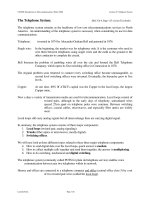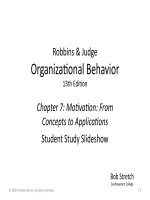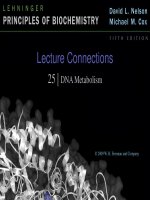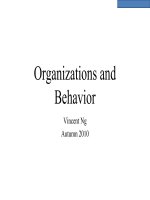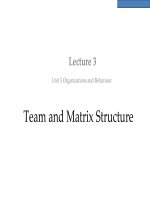OB lecture 25 contemporary motivation theories
Bạn đang xem bản rút gọn của tài liệu. Xem và tải ngay bản đầy đủ của tài liệu tại đây (281.21 KB, 45 trang )
Lecture 25
Contemporary Motivation Theory
Classical Motivation Theories…
Mostly were not supported by empirical
research (no Grounded Theory)
Difficult to apply directly in management.
Contemporary Motivation Theory
4. McClelland Theory of Needs
5. Four-Drive Theory
6. Expectancy Theory
7.
8.
9.
‘Goal Setting’ Theory
‘Feedback’ Theory
Equity Theory
McClelland’s Theory of
Needs (1961)
• Needs for Achievement (nAch)
• Needs for Affiliation (nAff)
• Needs for Power (nPow)
McClelland’s Theory of
Needs
You can find out your needs by test
Needs for Achievement
(nAch)
The drive to excel, to achieve in relation to a
set of standards, to strive to succeed.
People with high nAch desire unambiguous
feedback and recognition for their success.
Money is a weak motivator.
People with low nAch work better when
money is used as motivation.
Needs for Affiliation (nAffn)
Needs for Affiliation refers to a desire to
seek approval from others, conform to their
wishes and expectations, and avoid
conflicts and confrontation. People with
a strong nAffn try to project a favourable
images. They tend to actively seek support
from others and try to smooth out
workplace conflicts.
Needs for Affiliations
(nAffn)
High Affn employees work well in
coordination roles to mediate conflicts and
sales positions where the main task is
cultivating long term relationship.
They tend to be less effective in allocating
scarce resources and making decision
That potential generate conflicts.
Common errors in English
Expression in Assignment 1
2 ‘verbs’ together
Change it to
….. is cultivating
Gerund: A verbal that ends in "-ing" and functions
in a sentence as a noun.
….. is to cultivate…….
Infinitive - a verbal (usually preceded by
"to") that functions as a noun, an adjective, or an
adverb.
Needs for Affiliations
(nAffn)
People in decision-making positions must
Have a relatively low need for affiliation so
that their choices and actions are not biased
A personal need for approval.
Need for Power (nPow)
People with a need for power want to
exercise control over others and are
concerned about maintaining their
Leadership position.
=> Stalin
Need for Power (nPow)
They frequently rely on persuasive
communication, make more suggestions in
meetings.
Need for Power (nPow)
McClellend suggested 2 types of nPow.
1.Personalized Power
Use it to advance personal interests
Wear power as a status symbol\
Need for Power (nPow)
2. Socialized Power
Desire power as a mean to help other.
Good leader should have a high need of
socialized power than personal power.
They must have a high degree of altrusim
and social responsibility and be concerned
about the consequences of
of their own actions on others.
Application of McClellend’s
Theory
McClelland’s Theory is called Learned
Needs Theory
Our need strength can be altered through
social influence… (including training,
motivation program)
He has proven it in ‘Needs for Achievement’
Performance improved after ‘motivation’
training.
Motivation Course
It works !
Anthony Robbins
$$$$$$$$ !
Four Drive Theory
Four Drive Theory
This is almost the latest, and supported by
neuroscience.
Paul Lawrence and Nitin Nohria 2002
Harvard Business School
“How Human Nature shapes Our Choices”
Neuroscience
Four Drive Theory
• Drive to Acquire
• Drive to Bond
• Drive to Learn
• Drive to Defence
• ..
Need and Drive
Drive
Innate, hardwired characteristics of our brain
Need
Goal directed forces that people experience
Drive to Acquire
This is the drive to seek, take control,
and retain objects and personal experiences.
It includes enhancing one self concept
through status and recognition in society.
This is the foundation for competition and
the basis for our needs for self esteem.
Our drive to acquire is insatiable, not just to
fullfill one’s physiological needs.
Drive to Bond
This is to the drive to form social
Relationships and develop mutual caring
commitments to others
People who lack social contact are more
prone to serious illness.
Drive to bond is to fundamental ingredient
To successful organization and society.
Drive to Learn ****
This is the drive to satisfy our curiosity, to know, and to
understand ourselves and our environment around us
When observing something that is not consistent with or
beyond our current knowledge, we experience a tension
that motivates us to close the gap.
People who removed from novel information craved even
boring information.
